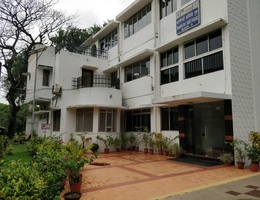Overview
Publications
Recruitment
CIFRI Corners'
 Since its inception in 1947 and formal establishment as the ICAR–Central Inland Fisheries Research Institute in 1961, ICAR-CIFRI has served as the national think tank and scientific backbone for India’s inland open water fisheries. Over the decades, the Institute has generated evidence-based technologies, policy inputs, and management frameworks that have shaped sustainable fisheries governance in the country.
Since its inception in 1947 and formal establishment as the ICAR–Central Inland Fisheries Research Institute in 1961, ICAR-CIFRI has served as the national think tank and scientific backbone for India’s inland open water fisheries. Over the decades, the Institute has generated evidence-based technologies, policy inputs, and management frameworks that have shaped sustainable fisheries governance in the country.
India’s inland open water resources—rivers, reservoirs, floodplain wetlands, estuaries, lagoons, and backwaters—constitute a strategic national asset. These ecosystems not only contribute to food and nutritional security but also support the livelihoods of nearly 1.24 million inland fishers, many from socially and economically vulnerable communities. However, overexploitation, hydrological modifications, habitat degradation, pollution, and climate variability pose systemic risks to their sustainability. Addressing these challenges demands a science-driven, policy-aligned, and institutionally coordinated response.
In this context, ICAR-CIFRI is committed to integrating innovation, climate resilience, and responsible commercialization to strengthen sustainable fisheries, enhance rural livelihoods, and accelerate India’s Blue Economy. Our approach aligns with national development priorities and the vision of Viksit Bharat @2047, wherein ecological sustainability, economic growth, and social equity are pursued in an integrated manner.
The Institute’s research and policy thrust areas include fisheries enhancement and scientific stock management in reservoirs and wetlands; riverine and estuarine ecosystem conservation; environmental flow assessment; habitat fingerprinting; GIS- and remote sensing-based resource mapping; ecosystem health benchmarking; pollution abatement; fish disease surveillance; biodiversity conservation; and climate-resilient fisheries modeling. Equal emphasis is placed on developing decision-support systems, resource assessment and forecasting models, valuation of ecosystem services, and participatory governance frameworks to inform evidence-based policymaking.
ICAR-CIFRI is also advancing frontier research in genomics, metagenomics, proteomics, and nanotechnology to provide next-generation solutions for sustainable aquatic ecosystem management. As a scientific partner in the National Mission for Clean Ganga (Namami Gange), the Institute contributes to assessment, conservation planning, and restoration strategies for the Ganga river system, reinforcing the integration of fisheries science within river basin management policies.
Through ICAR’s Farmers FIRST and Mera Gaon Mera Gaurav initiatives, along with targeted interventions under the Tribal Sub Plan in ecologically sensitive regions such as the Sundarbans, the Institute ensures that research outcomes are translated into field-level impact, capacity building, and livelihood enhancement. Collaborative engagements with national institutions, state fisheries departments, and international organizations further strengthen policy coherence and technology dissemination.
As we advance toward Viksit Bharat @2047, our mandate extends beyond research excellence to strategic leadership in inland fisheries governance. By fostering coordinated scientific efforts, inter-institutional partnerships, and outcome-oriented policy frameworks, ICAR-CIFRI aims to position India as a global leader in sustainable inland fisheries and Blue Economy development. Through science-led stewardship and inclusive growth, we remain committed to securing resilient aquatic ecosystems and prosperous fishing communities for generations to come.
Knowledge base
Others
External links
ICAR - CIFRI
















